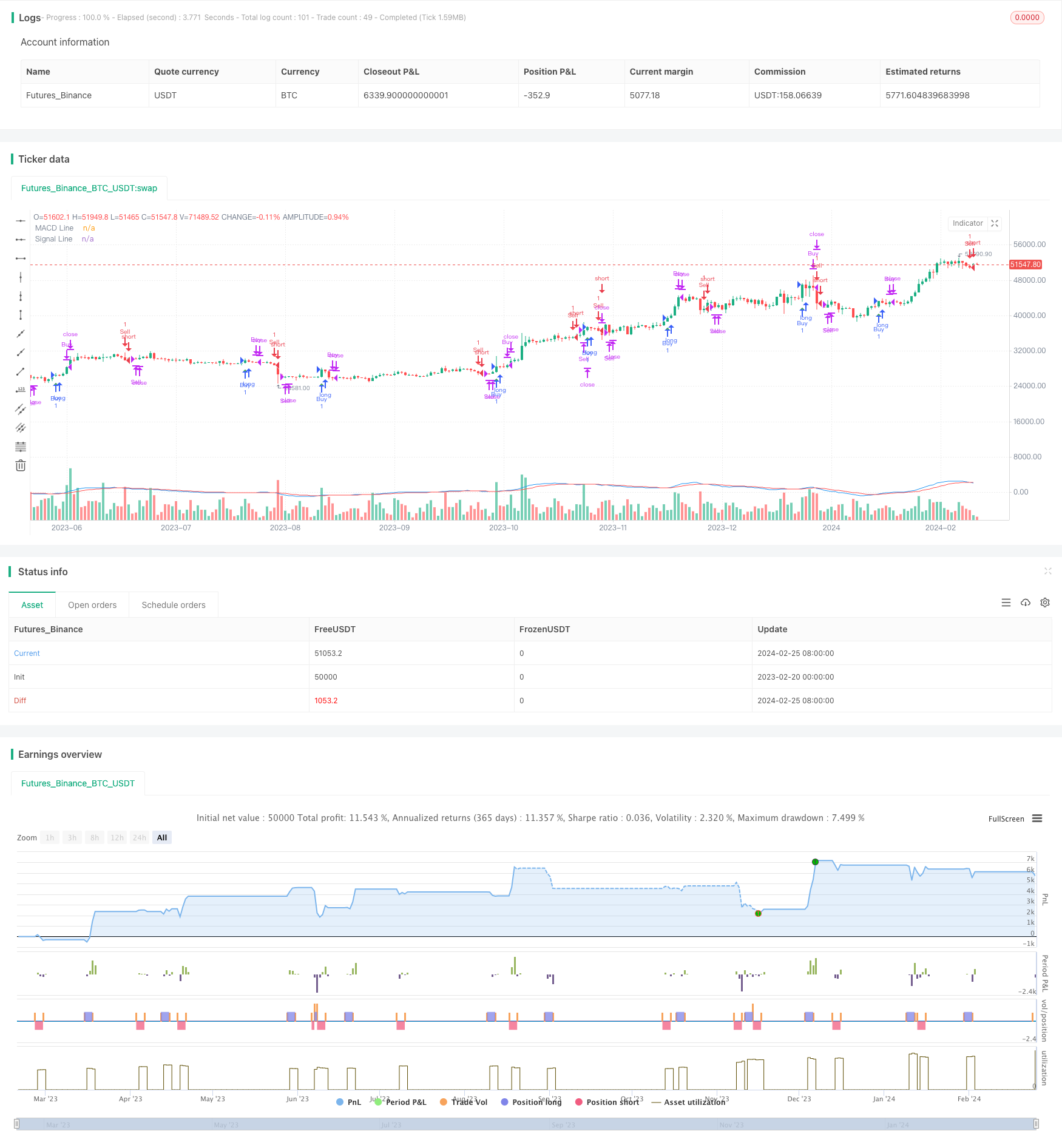
概述
该策略将移动平均聚散指标(MACD)与相对强弱指数(RSI)结合,在MACD金叉时检查RSI是否高于50以确认买入信号,在MACD死叉时检查RSI是否低于50以确认卖出信号。这可以过滤掉一些假信号,提高策略的稳定性。
策略原理
策略的核心在于MACD指标的交叉以及RSI指标的多空判断。
MACD指标由快线、慢线和柱状线组成。当快线上穿慢线时产生买入信号,称为金叉;当快线下穿慢线时产生卖出信号,称为死叉。金叉表示市场上涨势头增强,可以考虑做多;死叉表示市场下跌势头加强,可以考虑做空。
RSI指标判断超买超卖,若RSI高于50表示处于多头市场,买入信号具有更高的可靠性;若RSI低于50表示处于空头市场,卖出信号更可靠。
因此,当發生MACD金叉,若此时RSI高于50,会增强金叉买入信号的可靠性;当發生MACD死叉,若此时RSI低于50,会增强死叉卖出信号的可靠性。
本策略的交易规则为:
当MACD金叉且RSI高于50时,做多
当MACD死叉且RSI低于50时,做空
MACD交叉后固定条数退出
优势分析
该策略结合MACD和RSI指标的优势,可以有效过滤假信号,避免失误交易。具体优势如下:
MACD指标判断市场趋势和交叉信号是该策略的核心,MACD具有趋势跟踪性强、指标意义明确、使用广泛等优势。
RSI指标有助于判断超买超卖,过滤不可靠信号。RSI易于使用,参数设定简单。
两种指标结合使用,可以达到互补的效果。MACD判定趋势方向和交叉信号,RSI辅助过滤信号。这种组合清晰明确,易于执行。
固定的退出机制可以锁定收益,管理风险。不会因为交易时间过长导致亏损扩大。
风险分析
尽管该策略有许多优点,但仍存在一些潜在风险需要注意:
MACD指标可能会产生错误信号或滞后信号,即当价格变化较快时,MACD指标的交叉信号可能会滞后,导致错过最佳入场时机。
RSI指标也可能产生错误信号。当市场陷入震荡时,RSI可能来回穿越50线,导致产生频繁但不可靠的交易信号。
固定退出机制无法充分捕捉趋势行情。当趋势行情出现时,过早退出会导致错失获利机会。
该策略更适合于短线交易,在中长线上其效果可能会打折扣。中长线行情需要考量更多复杂因素。
针对上述风险,我们可以通过调整参数、优化组合方式、设置止损和止盈、结合其他因素等方法加以缓解。
优化方向
该策略可作以下几个方面的优化:
优化MACD参数。可以测试不同的参数组合,找到最匹配的快慢线差值。
优化RSI参数。可以测试长短期RSI的组合使用。
增加止损机制。设定合理的止损点,有助于及时减少损失。
增加其他因子。可结合交易量、波动率等指标进一步确认信号的可靠性。
根据市场条件动态调整退出规则,而不是固定的条形数。这可以在强势趋势中帮助锁定更多利润。
使用机器学习技术持续监控并随时间提高策略性能。
总结
该MACD与RSI结合的交叉策略,融合了两种常用技术指标的优势。它可以有效判断市场趋势,明确反转信号,同时通过RSI过滤,避免了大量假信号的干扰。总的来说,该策略适合短线捕捉反转,简单易用,实战效果较好。当然,任何策略都不可能面面俱到,我们仍需要不断优化组合与管理方式,结合更多因素,以应对复杂多变的市场环境。
/*backtest
start: 2023-02-20 00:00:00
end: 2024-02-26 00:00:00
period: 1d
basePeriod: 1h
exchanges: [{"eid":"Futures_Binance","currency":"BTC_USDT"}]
*/
// This Pine Script™ code is subject to the terms of the Mozilla Public License 2.0 at https://mozilla.org/MPL/2.0/
// © ayamtech1
//@version=5
strategy("MACD Crossover Strategy with RSI Confirmation", overlay=true)
// Input parameters
fast_length = input(12, title="MACD Fast Length")
slow_length = input(26, title="MACD Slow Length")
signal_smoothing = input(9, title="MACD Signal Smoothing")
exit_after_bars = input(3, title="Exit After Bars")
rsi_length = input(14, title="RSI Length")
// MACD calculation
[macdLine, signalLine, _] = ta.macd(close, fast_length, slow_length, signal_smoothing)
// MACD crossover conditions
bullish_cross = ta.crossover(macdLine, signalLine)
bearish_cross = ta.crossunder(macdLine, signalLine)
// RSI calculation
rsi = ta.rsi(close, rsi_length)
// Variables to track RSI crossing
var above_50 = false
var below_50 = false
// Check for RSI crossing above 50
if (rsi > 50 and rsi[1] <= 50)
above_50 := true
// Check for RSI crossing below 50
if (rsi < 50 and rsi[1] >= 50)
below_50 := true
// Strategy execution
if (bullish_cross and above_50)
strategy.entry("Buy", strategy.long)
if (bearish_cross and below_50)
strategy.entry("Sell", strategy.short)
// Exit condition
exit_condition_long = ta.barssince(bullish_cross) >= exit_after_bars
exit_condition_short = ta.barssince(bearish_cross) >= exit_after_bars
if (exit_condition_long)
strategy.close("Buy")
if (exit_condition_short)
strategy.close("Sell")
// Plot MACD lines
plot(macdLine, color=color.blue, title="MACD Line")
plot(signalLine, color=color.red, title="Signal Line")
// Plot buy and sell signals
plotshape(series=bullish_cross and above_50, title="Bullish Cross", location=location.belowbar, color=color.green, style=shape.triangleup, size=size.small)
plotshape(series=bearish_cross and below_50, title="Bearish Cross", location=location.abovebar, color=color.red, style=shape.triangledown, size=size.small)